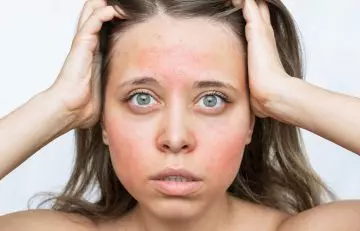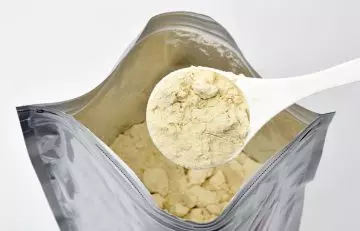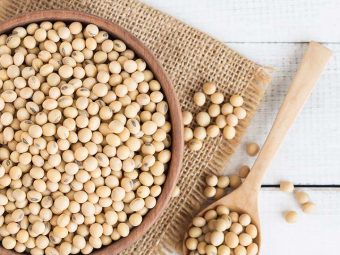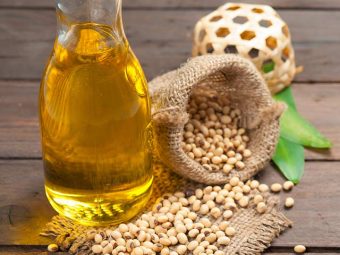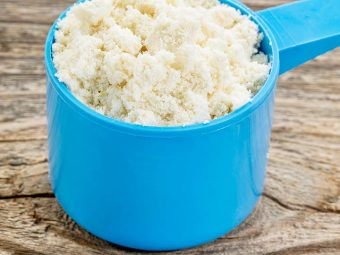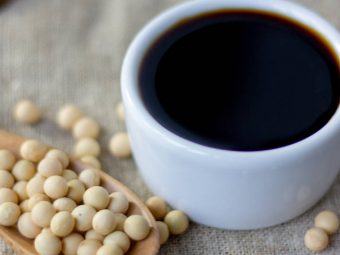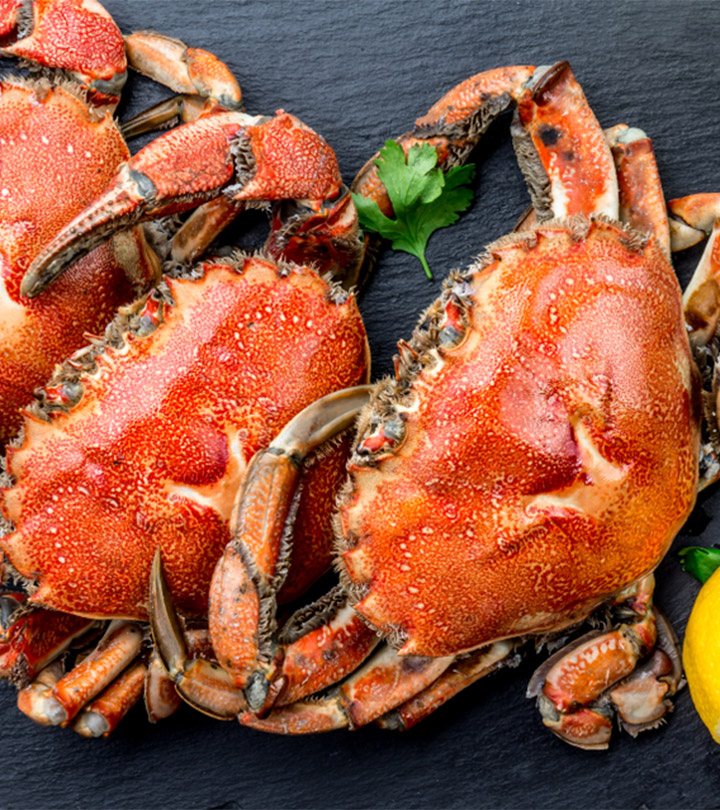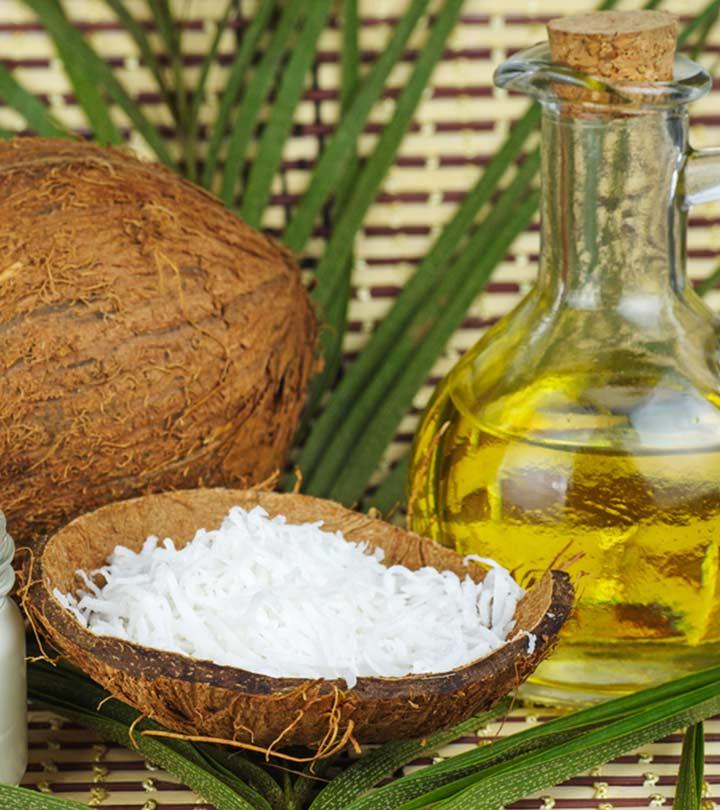What Are The Side Effects Of Soybeans?
It seems the perfect vegan option. But beware of the negative effects of consuming soy.
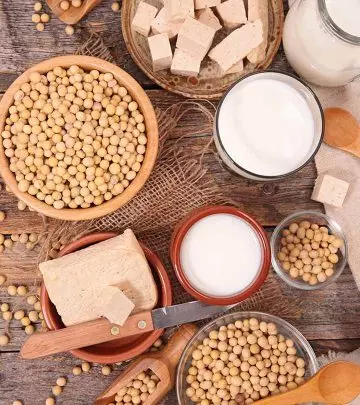
Image: Shutterstock
Soybeans are rich in nutrients and are touted for their multitude of benefits. However, concerns about the side effects of soy proteins are on the rise.
These widely consumed legumes are often found in many processed foods, and their protein is extracted from their outer shells (1), (2). Soybeans are also rich in various vitamins and minerals like calcium, zinc, iron, and amino acids (3).
But when you consume them in excess quantities, their protein content may interfere with thyroid regulation, cause testosterone imbalance and allergic reactions, and increase the risk of cancer proliferation.
This article further discusses the side effects of soybeans and their proteins in detail. Take a look.
 Know The Flip Side: Soybeans
Know The Flip Side: SoybeansShort-Term Effects
It may cause constipation, stomach ache, or diarrhea.
Long-Term Effects
It may lower sperm concentration and increase the risk of cancer and dementia.
Drug Interactions
It may interfere with anticoagulants and cancer and hypothyroidism medications.
When To See A Doctor
If you experience excessive skin and throat itching, vomiting, wheezing, or diarrhea.
In This Article
What Is The Major Issue With Soybeans?
The major issue with soybeans is its isoflavone content.
Soybeans are reservoirs of phytoestrogens (isoflavones), which are structurally and functionally similar to the estrogen hormone in your body (3). Isoflavones are a class of phytoestrogens (also called soy proteins) found in soy and soy products. The following table should give you an idea about the isoflavone content in different soy foods.
| Unfermented soy foods | Isoflavone content (mg) |
|---|---|
| soy milk, 1 cup | 6 |
| tofu (bean curd), soft, 3 ounces | 20 |
| soybeans, mature, boiled, ½ cup | 55 |
| soybeans, dry roasted, 1 oz. | 40 |
| edamame, boiled, ½ cup | 16 |
| soy cheese, 1oz. | 2 |
| soy burger, 1 patty | 5 |
| Fermented soy foods | Isoflavone content (mg) |
| miso, 3 oz. | 37 |
| natto, 3 oz. | 70 |
| tempeh, cooked, 3 oz. | 30 |
| soy sauce, 1 tbsp | 0.02 |
Source: Harvard T.H.Chan School of Public Health
Soy phytoestrogens have been used to compensate for estrogen hormone deficiency. Soy protein is a part of the estrogen replacement therapy given to women who are going through menopause (3).
Some epidemiological studies suggest that dietary intake of phytoestrogens may reduce the incidence of postmenopausal cardiovascular disease, osteoporosis, and hot flashes, among other symptoms. Contrasting data has also reported on the potential of phytoestrogens to prevent cancers of the breast and prostate (3).
In a cohort study from 2020 involving 52,795 North American women, the substitution of dairy milk with soy milk in the daily diet showed a reduced risk of breast cancer. No clear association was found between soy milk intake and breast cancer independent of dairy intake. However, hazard ratios of 1.22 and 1.50 were observed with high consumption of dairy calories and dairy milk, respectively, which dropped down to 0.68 after substitution.
 Trivia
TriviaHowever, the benefits of soy have been unclear. In fact, certain other studies also state that soy protein could cause potential harm (3). Read on to find out more about the side effects of soy in females.
What Happens When You Consume Soybeans? What Causes The Adverse Effects?
When you consume soybeans (soy protein) in any form, the soy isoflavones (the phytoestrogens) bind to the estrogen receptors in your body. These phytoestrogens compete with the natural estrogen to bind to the receptors. This results in a weak estrogenic or anti-estrogenic activity. In other words, soy isoflavones could make the natural estrogen in your body less effective (3), (4).
Such interactions can lead to a hormonal imbalance and cause gender-related changes in girls. They may also exert anti-androgenic effects in men. Men may start growing breasts (gynecomastia) and experience a dip in their sperm concentration when on a high-soy diet (3).
Isoflavone overdose over a long period may stimulate the endometrium (uterus) and breasts in women. Therefore, anyone who has been treated for breast cancer is usually recommended to avoid soy protein (3).
Phytoestrogens can affect several physiological and pathological processes in the body. High doses of soy isolates may cause adverse effects on reproduction, skin, bone remodeling, cardiovascular system, nervous system, immune system, and metabolism.
Let’s take a look at the adverse effects of soybeans (soy proteins) in detail.
What Are The Adverse Effects Of Soybeans (Soy Protein)?
1. May Interfere With Thyroid Regulation
Soy foods may increase the risk of developing hypothyroidism in people with compromised thyroid function. Such individuals may develop goiter and autoimmune thyroid disease. This risk further increases when the individual’s iodine intake is low (5).
Soy isoflavones have been found to inhibit the activity of an enzyme called thyroid peroxidase. This enzyme is required for the synthesis of the thyroid hormone. This is why you may face a risk of hypothyroidism when you eat a lot of soy protein (6).
Soy products also interfere with the absorption of levothyroxine (L-thyroxine), a drug used to treat thyroid hormone deficiency (7). Since soy proteins seem to alter the availability of the drugs, you may be advised against consuming soy protein if you have a thyroid imbalance.
However, just a high intake of soy isoflavones does not appear to increase the risk of hypothyroidism, unless coupled with inadequate consumption of dietary iodine. Therefore, the influence of soy protein on the thyroid gland is debatable. More research is warranted in this regard.
2. May Cause Testosterone Imbalance
A study was conducted on 12 male subjects who consumed 56 g of soy protein isolate daily for four weeks. As a result, their serum testosterone levels dropped by 19% (8). Though the data was inconsistent, it was found that soy protein decreased serum testosterone levels in healthy men.
Soy protein is said to have adverse effects on the male reproductive function. However, there are no specific studies in this regard. Some animal studies, in fact, state that soy isoflavones do not exert any feminizing effects on men (9).
Most of the observations are based on lab and animal studies. Hence, the relationship between soy isoflavones and testosterone is inconclusive (10).
3. May Elicit Hypersensitivity (Allergy)
Intolerance of soy products can cause allergies or hypersensitivity in children and adults. Often, soy allergy starts in infancy, with reaction to soy-Soy products that can cause allergies or hypersensitivity in children and adults. Often, soy allergy starts in infancy with a reaction to soy-based infant formula. However, most children outgrow soy allergy (11).
Generally, soy allergy is uncomfortable but not severe. An allergic reaction to soy is rarely frightening or lethal. except in the case of asthma. Symptoms of soy allergy may include tingling in the mouth, eczema or itchy skin, rashes, wheezing, diarrhea, stomach ache, headache, vomiting, and skin redness (flushing) (12).
If you experience any of these symptoms, you may have a soy allergy. Get tested to confirm the allergy. If tested positive, you may be advised against having soy products/isoflavones.
4. May Increase The Risk Of Cancer Proliferation
Soy isoflavones (one of them being genistein) may stimulate the proliferation of cancer cells in your body. This is especially true in the case of estrogen-dependent breast cancer, as soy isoflavones tend to have estrogenic effects (13).
As per animal studies, genistein may deregulate the cell cycle and trigger tumor development. It acts by triggering the estrogen receptors (14).
Contrarily, human studies show an inverse relationship between cancer and isoflavones. Soy intake was also found to reduce the incidence and death rate caused due to breast cancer. This could be because of the anti-estrogenic effect exerted by phytoestrogens (13).
The amount and source of soy isoflavones also greatly impact breast cancer risk (14).
5. May Trigger Alzheimer’s Dementia
Traditionally, soy foods were used in cooking only after fermenting. This two-step routine would destroy most of the anti-nutrients in soy, such as isoflavones (like genistein and daidzein) and DNA-altering enzymes (like topoisomerases) (15).
When you eat unfermented, cooked/uncooked soy foods, these anti-nutrients may affect the vital systems of your body, including your brain (15).
These anti-nutrients in soy could have detrimental effects on many individuals. Soy isoflavones could increase the risk of Alzheimer’s dementia (15).
If you are dealing with dementia or have a family history of this condition, it is safe to reduce your soy consumption (15).
6. May Cause Infant Health Issues
Infant food formulas contain fair amounts of soy protein/isoflavones. Infants who are fed these formulas are exposed to 5.7–11.9 mg isoflavones/kg body weight during the first four months of life (16).
These kids are exposed to 6–11 times higher levels of isoflavones than adults. This could lead to disturbances in the reproductive health and endocrine function in the child. The major isoflavones, daidzein and genistein, preferentially bind to the estrogen receptors in the body (16).
However, these conclusions are based on animal studies. Human studies may give a different picture. Moreover, currently available soy-based formulas show no overt toxicities in healthy infants (16), (17). Hence, check with your pediatrician before giving soy-based formulas to your child.
7. Unsure Osteoprotective Effects
Soy protein has shown to conserve bone mineral density, particularly in postmenopausal women. In perimenopausal women, the soy isoflavones were shown to prevent bone loss from the lumbar spine. These compounds had no significant effect (neither positive nor negative) on bone formation and/or bone resorption (18).
In some cases, the mineral balance could be impaired with soy consumption. Soybeans contain (by weight) about 1–3% phytic acid (also called phytate). Phytic acid is an anti-nutrient that binds to minerals like zinc, iron, and calcium. Along with soy isoflavones, phytic acid also may decrease their bioavailability (18).
However, a major chunk of literature highlights the osteoprotective effect of soy protein. Further research is needed to determine the precise impact of soy protein/foods on bone density and other related diseases (19).
8. May Cause Weight Gain
Soybeans are a source of calories and essential nutrients (20). Consuming them in moderation is not likely to cause weight gain. However, excess consumption of soy-based foods, especially highly processed options, can contribute to increased calorie intake, potentially leading to weight gain. An animal study found that excess amounts of soy isoflavones may increase body weight and fat percentage (21). However, more human studies are needed in this regard.
It is important to remember that each person’s metabolism and response to different foods can vary. Some individuals may incorporate soybeans into their diet without gaining weight, while others might need to be mindful of their portion sizes and overall calorie intake. Consult a registered dietitian for the suitable portion size for you.
Most of the research on soybeans and soy protein is still unclear. While in some studies they seem to promote health, certain other studies tend to state the potential harm they may cause. However, this does not mean you have to totally be off soy. There are a few specific soy products you may want to avoid.
Which Soy Products Should You Avoid?
Moderation is important, and so is eating right. Choosing the right kind of soy products can protect you from the adverse effects mentioned above.
When given a choice between natural soy foods and soy protein isolate, go for the natural options. Avoid industrial soy foods if you have iodine deficiency or thyroid imbalance (15).
Whole soy foods are mostly fermented and cooked in a healthier manner. You can take tofu, edamame, soy milk, tempeh, miso, and natto a few times every week.
 Fun Fact
Fun FactHow Much Soy Is Safe To Eat In A Day?
According to the US FDA, daily consumption of 25 g of soy seems to be safe. This amount of soy could also help lower cholesterol levels (22).
It also is believed that the intake of 50 g of soy protein per day could help prevent heart disease, diabetes, and estrogen-dependent cancers. However, more research is warranted.
There is limited information on the excess intake of soy protein/soybeans. But we don’t recommend you take more than 25 grams per day.
Is Eating Too Much Soy Harmful?
There is little information about the toxicity of soy protein. In limited doses, soy protein may be helpful for women who are at a high risk of breast cancer (23).
Some studies reported very few drug-related adverse events, which were mild. In very few cases, high levels of soy isoflavones adversely affected blood pressure levels (24).
Hence, it is important you talk to your healthcare provider about a suitable dosage for you.
Infographic: Top 5 Side Effects Of Soybeans
Soybeans are a storehouse of powerful nutrients that offer a plethora of health benefits. However, excess consumption may cause an allergic reaction or issues in infants. Check out the infographic below for the top 5 side effects of soybeans you should know about before including them in your diet.

Illustration: StyleCraze Design Team
Soy protein side effects are attributed especially to soy isoflavones, which render natural estrogen activity in the body less effective, leading to hormonal imbalance. Soy foods may also increase the risk of hypothyroidism, especially if the iodine intake is low. Also, some individuals, including infants, may be allergic to soy foods and may experience itchy skin, diarrhea, vomiting, stomach ache, etc. So, avoid eating them once you encounter these symptoms. Moreover, soy isoflavones are said to aid in the multiplication of cancer cells and increase cancer risk. Hence, it is advised to consume soy in recommended dosages.
Frequently Asked Questions
Which protein is better – soy or whey?
It depends on your personal preference. Both proteins showed no significant differences in muscle growth. However, whey protein may have a slight edge due to its slightly higher leucine content (25).
Does soy cause gas and bloating?
Yes, consumption of soy products may result in excessive intestinal gas. Legumes contain high levels of the indigestible oligosaccharides raffinose and stachyose, which are fermented in the colon by bacteria (26).
Can soy cause sinus problems?
Possibly. If you are sensitive or allergic to soy, you may face sinus problems.
Is soy protein hard to digest?
It varies from individual to individual. For some people, it may cause indigestion, and they may experience gas, bloating, nausea, stomach pains, or discomfort.
Key Takeaways
- Soy products may affect the synthesis of essential hormones like thyroid and testosterone.
- Consuming soybean-based foods may cause allergic reactions with symptoms like itchy skin, diarrhea, and vomiting.
- Unfermented soy foods may affect the brain and increase the risk of dementia.
- Instant food formulas with soy protein may also affect reproductive health and endocrine function in children.
- Daily consumption of 25g of soy is considered safe by US FDA.
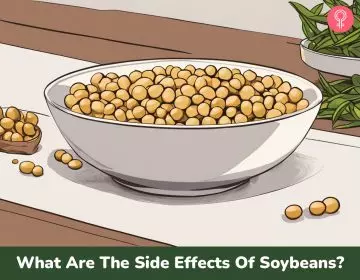
Image: Stable Diffusion/StyleCraze Design Team
Explore how soy can damage your body and the hidden threats it poses. Check out the video below to learn about the possible side effects related to soy and how to avoid them.
References
Articles on StyleCraze are backed by verified information from peer-reviewed and academic research papers, reputed organizations, research institutions, and medical associations to ensure accuracy and relevance. Read our editorial policy to learn more.
- An insight into the harmful effects of soy protein: A review, La Clinica Terapeutica, US National Library of Medicine, National Institutes of Health.
https://www.ncbi.nlm.nih.gov/pubmed/26152621 - Soy Protein, The Journal of Perinatal Education, US National Library of Medicine, National Institutes of Health.
https://www.ncbi.nlm.nih.gov/pmc/articles/PMC1595159/ - Soy and phytoestrogens: possible side effects, German Medical Science, US National Library of Medicine, National Institutes of Health.
https://www.ncbi.nlm.nih.gov/pmc/articles/PMC4270274/ - Phytochemicals Targeting Estrogen Receptors: Beneficial Rather Than Adverse Effects?, International Journal of Molecular Sciences, US National Library of Medicine, National Institutes of Health.
https://www.ncbi.nlm.nih.gov/pmc/articles/PMC5535874/ - Effects of soy protein and soybean isoflavones on thyroid function in healthy adults and hypothyroid patients: a review of the relevant literature, Thyroid: Official Journal of the American Thyroid Association, US National Library of Medicine, National Institutes of Health.
https://www.ncbi.nlm.nih.gov/pubmed/16571087 - Systematic Review and Meta-analysis on the Effect of Soy on Thyroid Function, Scientific Reports, US National Library of Medicine, National Institutes of Health.
https://www.ncbi.nlm.nih.gov/pmc/articles/PMC6408586/ - Unawareness of the effects of soy intake on the management of congenital hypothyroidism, Pediatrics, US National Library of Medicine, National Institutes of Health.
https://www.ncbi.nlm.nih.gov/pubmed/22908106 - Effect of Soy Protein on Testosterone Levels, Cancer Epidemiology, Biomarkers & Prevention, AACR Publications.
https://cebp.aacrjournals.org/content/16/12/2795.long - Soybean Isoflavone Exposure Does Not Have Feminizing Effects on Men: A Critical Examination of the Clinical Evidence, Fertility and Sterility, US National Library of Medicine, National Institutes of Health.
https://pubmed.ncbi.nlm.nih.gov/20378106-soybean-isoflavone-exposure-does-not-have-feminizing-effects-on-men-a-critical-examination-of-the-clinical-evidence/ - Soy, Soy Foods and Their Role in Vegetarian Diets, Nutrients, US National Library of Medicine, National Institutes of Health.
https://www.ncbi.nlm.nih.gov/pmc/articles/PMC5793271/ - Soy hypersensitivity in children with food allergy, Annals of Allergy, US National Library of Medicine, National Institutes of Health.
https://www.ncbi.nlm.nih.gov/pubmed/1380784 - Soy Allergy in Patients Suffering from Atopic Dermatitis, Indian Journal of Dermatology, US National Library of Medicine, National Institutes of Health.
https://www.ncbi.nlm.nih.gov/pmc/articles/PMC3726893/ - Genistein: does it prevent or promote breast cancer?, Environmental Health Perspectives, US National Library of Medicine, National Institutes of Health.
https://www.ncbi.nlm.nih.gov/pmc/articles/PMC1638285/pdf/envhper00309-0057.pdf - Dietary Isoflavones and Breast Cancer Risk, Medicines, US National Library of Medicine, National Institutes of Health.
https://www.ncbi.nlm.nih.gov/pmc/articles/PMC5590054/ - A possible cause of Alzheimer’s dementia – industrial soy foods, Medical Hypotheses, US National Library of Medicine, National Institutes of Health.
https://www.ncbi.nlm.nih.gov/pubmed/24440006 - Early Exposure to Soy Isoflavones and Effects on Reproductive Health: A Review of Human and Animal Studies, Nutrients, US National Library of Medicine, National Institutes of Health.
https://www.ncbi.nlm.nih.gov/pmc/articles/PMC3257624/ - Concerns for the use of soy-based formulas in infant nutrition, Paediatrics Child Health, US National Library of Medicine, National Institutes of Health.
https://www.ncbi.nlm.nih.gov/pmc/articles/PMC2661347/ - The effect of soy food intake on mineral status in premenopausal women, Journal of Women’s Health, US National Library of Medicine, National Institutes of Health.
https://www.ncbi.nlm.nih.gov/pubmed/21486162 - The Significance of Soy Protein and Soy Bioactive Compounds in the Prophylaxis and Treatment of Osteoporosis, Journal of Osteoporosis, US National Library of Medicine, National Institutes of Health.
https://www.ncbi.nlm.nih.gov/pmc/articles/PMC2957241/ - Soybeans, mature seeds, raw, U.S. DEPARTMENT OF AGRICULTURE
https://fdc.nal.usda.gov/fdc-app.html#/food-details/174270/nutrients - Regulation of soy isoflavones on weight gain and fat percentage: evaluation in a Chinese Guangxi minipig model, Animal Journal, US National Library of Medicine, National Institutes of Health.
https://pubmed.ncbi.nlm.nih.gov/22440466/ - Soy Protein, Isoflavones, and Cardiovascular Health: A Summary of a Statement for Professionals From the American Heart Association Nutrition Committee, ResearchGate.
https://www.researchgate.net/publication/6927948_Soy_Protein_Isoflavones_and_Cardiovascular_Health_A_Summary_of_a_Statement_for_Professionals_From_the_American_Heart_Association_Nutrition_Committee - Is Soy Consumption Good or Bad for the Breast?, The Journal of Nutrition, US National Library of Medicine, National Institutes of Health.
https://www.ncbi.nlm.nih.gov/pmc/articles/PMC2981011/#__sec9title - Effects of a high daily dose of soy isoflavones on DNA damage, apoptosis and estrogenic outcomes in healthy, postmenopausal women – a Phase I clinical trial, Menopause, Author manuscript, HHS Public Access, US National Library of Medicine, National Institutes of Health.
https://www.ncbi.nlm.nih.gov/pmc/articles/PMC2574732/ - The pros and cons of phytoestrogens, Frontiers of Neuroendocrinology, US National Library of Medicine, National Institutes of Health.
https://www.ncbi.nlm.nih.gov/pmc/articles/PMC3074428/ - No Significant Differences in Muscle Growth and Strength Development When Consuming Soy and Whey Protein Supplements Matched for Leucine Following a 12 Week Resistance Training Program in Men and Women: A Randomized Trial
https://www.ncbi.nlm.nih.gov/pmc/articles/PMC7312446/ - Gas production in human ingesting a soybean flour derived from beans naturally low in oligosaccharides
https://pubmed.ncbi.nlm.nih.gov/9925135/






